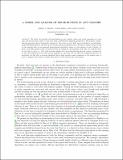A MODEL AND ANALYSIS OF HOUSE-HUNTING IN ANT COLONIES
Author(s)
Nancy Lynch
DownloadBDA_Extended_Abstract.pdf (332.0Kb)
Open Access Policy
Open Access Policy
Creative Commons Attribution-Noncommercial-Share Alike
Terms of use
Metadata
Show full item recordAbstract
We study the problem of house-hunting in ant colonies, where ants reach consensus on a new
nest and relocate their colony to that nest, from a distributed computing perspective. We propose a househunting
algorithm that is biologically inspired by Temnothorax ants. Each ant is modelled as a probabilistic
agent with limited power, and there is no central control governing the ants. We show a
(log n) lower bound
on the running time of our proposed house-hunting algorithm, where n is the number of ants. Further, we
show a matching upper bound of expected O(log n) rounds for environments with only one candidate nest
for the ants to move to. Our work provides insights into the house-hunting process, giving a perspective
on how environmental factors such as nest qualities or a quorum rule can a ect the emigration process. In
particular, we nd that a quorum threshold that is high enough causes transports to the inferior nest to
cease to happen after O(log n) rounds when there are two nests in the environment.
Date issued
2021Department
Massachusetts Institute of Technology. Department of Electrical Engineering and Computer Science; Massachusetts Institute of Technology. Computer Science and Artificial Intelligence LaboratoryJournal
8th Workshop on Biological Distributed Algorithms (BDA)
Citation
2021. "A MODEL AND ANALYSIS OF HOUSE-HUNTING IN ANT COLONIES." 8th Workshop on Biological Distributed Algorithms (BDA).
Version: Author's final manuscript